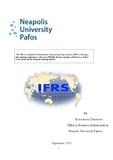| dc.contributor.advisor | Tsaklanganos, Angelos | |
| dc.contributor.author | Dimitriou, Konstantina | |
| dc.date.accessioned | 2016-01-05T08:15:25Z | |
| dc.date.available | 2016-01-05T08:15:25Z | |
| dc.date.issued | 2015 | |
| dc.identifier.uri | http://hdl.handle.net/11728/6984 | |
| dc.description.abstract | This research work examined the impact of International Financial Reporting Standard (IFRS) adoption on Banks performance. The study is based on the appraisal of IFRS compliance and Adoption. Both primary and secondary data were used in this study. The primary data would be sourced via a administered in a survey conducted on examining the convergence to IFRS in Banks, as a case study while the secondary data collected from Annual Report of Access European Banks as well as journals, textbooks and newspapers. The result of the analysis showed that at there is significant relationship adoption of IFRS and financial reporting of banks in European as well as in the Islamic accounting world, of Middle Eastern countries. However, comprehensive implementation of the standard to its totality by firms in the country, and the regulatory authorities should monitor strict compliance.
In addition this study provides an analysis of the disclosures made in the first year of mandatory adoption of IFRS 7 Financial Instruments: Disclosures, by the 24 largest European banks and summarizes areas of specific interest: disclosures relating to the use of fair values and to the credit crisis. Next it provides an analysis of the quantitative risk disclosures, followed by other types of disclosure.
The global financial crisis has been the pro-cyclical amplification of financial shocks through the banking system, financial markets and the broader economy.
The provisions of IAS 39-Financial Instruments-Recognition and Measurement issued by the International Accounting Standards Board (IASB), establishes the principles for recognizing and measuring financial assets and financial liabilities. This standard is of particular importance to the banking sector and NBFCs which deal primarily in financial instruments. IAS 39 includes provisions about classification of financial instruments, their ongoing measurement (including when impairment is required) and derecognition. The provisions of IAS 39 are currently applicable globally in respect of financial instruments.
Following the crisis, there was widespread criticism that the accounting standards, more so, fair value accounting significantly contributed to the financial crisis or at the very least exacerbated the severity of the crisis, in view of its failure to deal with illiquid markets and distressed sales. | en_UK |
| dc.language.iso | en | en_UK |
| dc.publisher | Business Administration Program, School of Economics Sciences and Business, Neapolis University Paphos | en_UK |
| dc.rights | Απαγορεύεται η δημοσίευση ή αναπαραγωγή, ηλεκτρονική ή άλλη χωρίς τη γραπτή συγκατάθεση του δημιουργού και κάτοχου των πνευματικών δικαιωμάτων | en_UK |
| dc.subject | International Financial Reporting Stanadard (IFRS) | en_UK |
| dc.subject | European Banking System | en_UK |
| dc.subject | Banks | en_UK |
| dc.subject | Middle Eastern countries | en_UK |
| dc.title | The effects on adoption of international financial reporting standards (IFRS), challenges and reporting implications in the case of Middle Eastern countries and Greece as well as in the context of the European banking industry | en_UK |
| dc.type | Thesis | en_UK |


